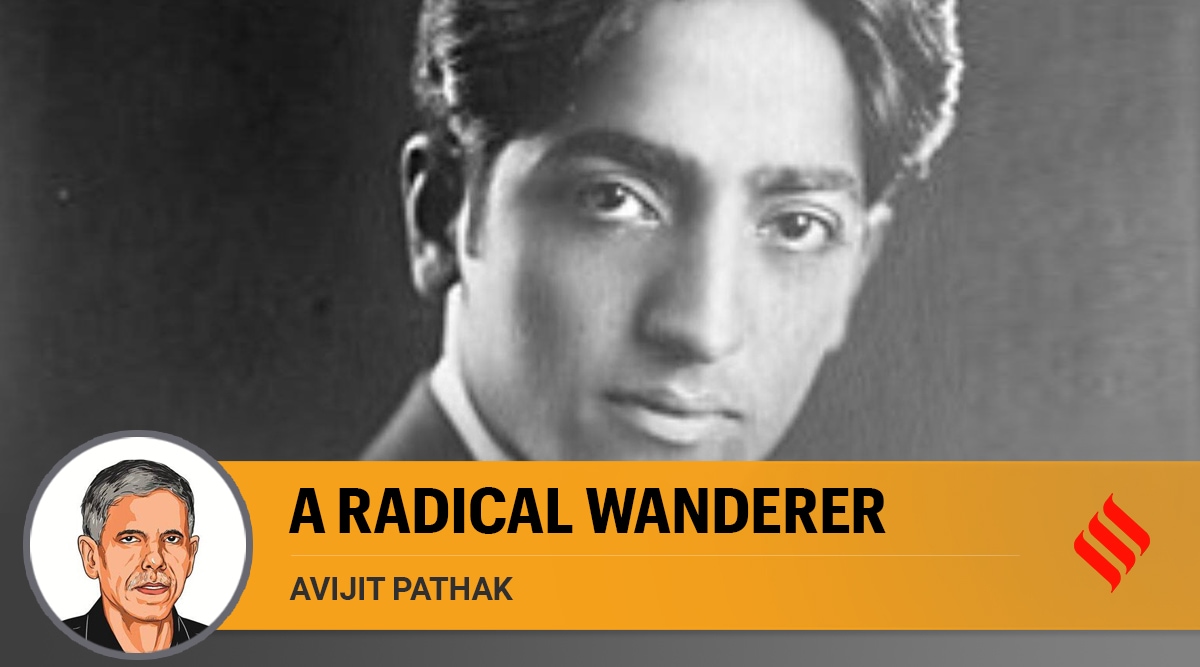 Jiddu Krishnamurti. (Photo: wikipedia.org)
Jiddu Krishnamurti. (Photo: wikipedia.org)I never belonged to the exclusivist camp of the followers of Jiddu Krishnamurti; nor did I learn the meaning of studentship from an institution that claims to follow his radical ideas of education. Yet, I dare to invoke this lifelong wanderer (May 11, 1895-February 17, 1986) on his birth anniversary. A seeker, he questioned the “certainty” of organised religions, and sought to free us from the baggage of accumulated knowledge. He moved around the world with an urge to communicate with us, decondition our minds, and inspire us to realise that truth, far from being a finished product, takes one to a “pathless land”.
Well, I know that my conditioned mind — a mind filled with egotistic concerns and associated fears and anxieties, or my temptation to categorise the world through some religious/secular texts (be it the Bhagavad Gita or the Bible, or the Das Kapital) — prevents me from becoming a wanderer, and living this very moment with freshness, innocence and mindfulness. And I am also aware of the fact that I too am a product of a “schooled” society that reduces education to the techniques of the acquisition of technical skills, or expertised knowledge in discrete academic disciplines, and the internalisation of the psychology of hyper-competitiveness to pass through the ritualisation of examinations and standardised tests.
Yet, despite these limitations, I cannot resist his call: “I want, therefore, to set man free, rejoicing as the bird in the clear sky,
unburdened, independent, ecstatic in that freedom… For this, you need not have an organisation based on spiritual belief… because Truth is in everyone; it is not far; it is not near; it is eternally there.”
I cannot claim that I understand him fully. However, as we experience the all-pervading violence — be it the violence in the name of religious nationalism, or violence in the name of education — Krishnamurti’s books and talks tend to acquire a new meaning and significance. To begin with, see the way organised religions with the heavy burden of ritualism and orthodoxies dictated by the non-reflexive priest craft continue to condition our minds even in this “secular” age. This sort of religion, far from encouraging one to be reflexive, meditative and peaceful, aims at the externalisation of one’s faith through the loud assertion of one’s “identity” or construction of gorgeous temples and mosques, or measuring the area in which God resides — Rama in Ayodhya, Krishna in Mathura or Allah in Mecca!
Best of Express Premium
Quite often, a modern nation-state stimulates the finitude of this measurable religious identity, activates totalitarian thinking, erects walls of separation, and causes an environment conducive to war and violence. And it is precisely at this moment of turmoil that I begin to recall what Krishnamurti would have regarded as the ecstasy of emancipatory religiosity, and see a new possibility: “It is explosive, new, young, fresh, innocent. The innocent mind, the young mind, the mind that is extraordinarily pliable, subtle has no anchor. It is only such a mind that can experience that which you call God, that which is not
measurable.”
While the freshness of this religiosity heals my tormented soul, I cannot forget the horror of yet another kind of violence sanctified in the name of educating the child. The neurotic obsession with ranking and comparing negates one’s uniqueness, and transforms one into a competitive, envious and fearful being. Furthermore, the one-dimensional emphasis on bookish knowledge negates one’s aesthetic and spiritual sensibilities. We compel our children to study physics or botany. But do we really encourage them to look at a tree with wonder, merge with the amazing sunset, and overcome the duality of the “observer” versus the “observed”? Our schools with CCTV cameras, our headmasters obsessed with the success stories of the “toppers”, and our Ed Tech companies with film stars as their spokespersons are not interested in this aesthetically enriched and ecologically sensitive ethos of learning and unlearning. Yet, my rebellious self feels like echoing with Krishnamurti: “Education is not just to pass examinations, take a degree, a job, get married and settle down, but also to be able to listen to the birds, to see the sky, to see the extraordinary beauty of a tree, and the shape of the hills, and to feel with them, to be really, directly in touch with them.”
Should we converse with this radical wanderer? Or should we brand him as “impractical”, and continue to indulge with the violence of everyday life?
This column first appeared in the print edition on May 11, 2022 under the title ‘A radical wanderer’. The writer taught sociology at JNU
- The Indian Express website has been rated GREEN for its credibility and trustworthiness by Newsguard, a global service that rates news sources for their journalistic standards.

